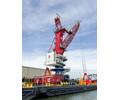Tide Turns in Favor of Greece’s Shipping Industry
By Aiswarya Lakshmi
August 11, 2015
An article in WSJ highlighted the Greek shipping industry, which it says has "emerged largely unscathed" from the nation's recent financial troubles.
The reports say that shipping companies in Greece are buying vessels from cash-strapped competitors and German banks, and are poised to grab even more market share - but bailout-related tax hikes could lead shipowners to seek cheaper waters.
Greek owners, who operate almost a fifth of the global fleet of merchant ships, are paying rock-bottom prices for competitors’ vessels. Shipping employs more than 200,000 people in Greece and contributes around 7.5% of Greece’s gross domestic product.
The industry is dominated by a small circle of family-run companies that control almost a fifth of the world’s shipping fleet—long a source of national pride.
According to Basil Karatzas, a New York-based maritime adviser, as the global financial crisis took hold and the freight market gradually collapsed, the Greeks stayed above water as they were not overly leveraged and stood on cash generated during the boom years before 2008.
The Greek-German maritime competition recently has taken on political overtones, as Athens is trying to secure a third bailout package from its international creditors to avoid a default on its debts that might force it to exit the eurozone.



